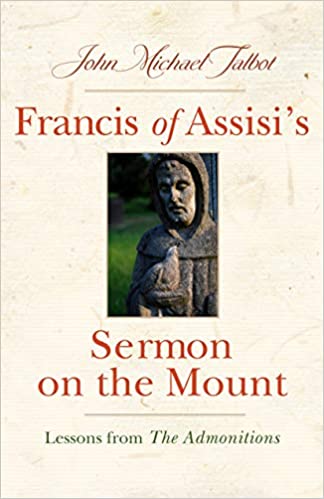 Musician, author, and Arkansas’ most famous monk, John Michael Talbot has written an interesting book on Francis of Assisi’s twenty-eight “Admonitions.” I usually read Talbot’s books anyway, but I read Francis of Assisi’s Sermon on the Mount: Lessons from The Admonitions in particular as a part of his Inner Room School of Spirituality which I am participating in as a personal devotional exercise. Talbot describes the origin of the Admonitions thus:
Musician, author, and Arkansas’ most famous monk, John Michael Talbot has written an interesting book on Francis of Assisi’s twenty-eight “Admonitions.” I usually read Talbot’s books anyway, but I read Francis of Assisi’s Sermon on the Mount: Lessons from The Admonitions in particular as a part of his Inner Room School of Spirituality which I am participating in as a personal devotional exercise. Talbot describes the origin of the Admonitions thus:
Most experts agree that the admonitions had their beginnings in short teachings St. Francis would provide for his spiritual brothers when they gathered for large community meetings. These teachings were then written down and compiled for the first time after Francis’ death. As you will soon see, they address very real, common problems, and this means they were intended to be put into practice by the friars. As in, first, listen—then, go do! (p.7)
The Admonitions will sound familiar to anyone familiar with Francis’ life and teachings, which is to say that they will sound convicting, at times painful, at times extreme, at times comforting, and always heart-stirring. Let me give a fairly typical example. This is Admonition 4:
I did “not come to be ministered unto, but to minister,” says the Lord. Let those who are set above others glory in this superiority only as much as if they had been deputed to wash the feet of the brothers; and if they are more perturbed by the loss of their superiorship than they would be by losing the office of washing feet, so much the more do they lay up treasures to the peril of their own soul.
And another, Admonition 6:
Let us all, brothers, consider the Good Shepherd who to save His sheep bore the suffering of the Cross. The sheep of the Lord followed Him in tribulation and persecution and shame, in hunger and thirst, in infirmity and temptations and in all other ways; and for these things they have received everlasting life from the Lord. Wherefore it is a great shame for us, the servants of God, that, whereas the Saints have practised works, we should expect to receive honor and glory for reading and preaching the same.
As I said, painful, but, for me anyway, greatly needed. The Admonitions are a good way for somebody unfamiliar with Francis to get a sense of what he was about.
Each chapter of this book begins with an Admonition which is then unpacked throughout the chapter by John Michael Talbot. Talbot’s commentary in each chapter is typical JMT! Which is to say the commentary is engaging, insightful, and very helpful. Talbot’s commentary is also oftentimes autobiographical and confessional. I appreciated this. He shares a number of very interesting insights into his personal life, his career as a musician, and especially his role as the head of a monastic family. Talbot can be quite self-deprecating about his own flaws, which I appreciated. A few times he talks about his own struggle with ego and the challenges of fame. Also, he offers a number of thoughts about the dangers of public ministry in particular.
This would be a good book to give someone who wants to consider basic issues of self-discipline and spiritual formation. It would also be a good book for pastors and ministry leaders to read. In the hands of Talbot, St. Francis’ teachings are shown to be relevant and significant. As a Protestant, there were, of course, some occasions where I simply had to observe as an outsider as well as a few occasions when I had to disagree, but none of this led me into conflict with the heart of the book, with the heart of Francis’ Admonitions, or with what Talbot is trying to accomplish here. On the contrary, I found the book very convicting and highlighted a number of areas to which I will return for further reflection.
